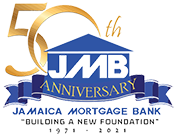The Jamaica Mortgage Bank was established on June 2, 1971 as a private limited liability company under the Companies Act of 1965. On June5, 1973 under an Act of Parliament no. 16 of 1973, the Bank was converted into a Statutory Corporation.
The main functions of the Bank are:
- The mobilization of loan funds for on-lending to public and private sector housing developers and to other lending institutions
- The operation of a secondary mortgage market facility
- The provision of mortgage insurance services on behalf of the Government of Jamaica in accordance with the Mortgage Insurance Act.
Policies, Charters and Terms of Reference of the Bank
- Terms of Reference for Board Committees
- Corporate Social Responsibility Policy
- JMB’s Code of Ethics
- Board Charter
- Anti-Sexual Harassment Policy
- JMB Stakeholder Engagement Communication Policy
- JMB Whistleblower Policy
- JMB Board Dispute Resolution Policy
Governance of the Bank
The Bank is managed by a Board of Directors which is responsible for the policy and general administration of the affairs of the Bank.
The Board should consist of not less than five nor more than seven directors appointed by the Minister with responsibility for the Bank.
The Board operates following the guidelines set out in The Jamaica Mortgage Bank Act, The Public Bodies Management and Accountability Act, The JMB’s Corporate Governance Policies and Procedures and other legislation and directives issued by the GOJ from time to time.
The Board currently has four sub-committees which have specific Governance responsibilities:
- The Projects & Loans Sub-Committee
- The Audit, Finance & Risk Management Sub-Committee
- The Human Resources Sub-Committee
- The Corporate Governance Sub-Committee
The Projects & Loans Sub-Committee is responsible for the following areas:
- Final assessment of construction loan applications before a recommendation to the full Board for approval;
- The review and monitoring of all the Project loans approved and disbursed by the Bank;
The Audit, Finance & Risk Management Sub-Committee is responsible for reviewing and advising the Board on the following areas:
- On practices and procedures which will promote the productivity and quality and volume of service;
- On the extent to which the objectives of the Bank are being achieved;
- On the adequacy, efficiency and effectiveness of the accounting and internal control structure and systems of the Bank;
- The Financial Statements that are to be included in the annual report;
- The Annual Auditor’s Report;
- The oversight of any internal audit of the Bank;
The Sub-committee will also perform such other functions as are assigned to it by the Board.
The mandate of the Human Resource Committee is to guide the strategic human resource development of the Bank and to have oversight of and authority for the framework governing the Bank’s Human Resource Policies. In carrying out its mandate the committee will perform various functions including:
- Evaluation and approval of policies and procedures related to the Bank’s human resource and personnel issues
- Evaluation of the Bank’s organizational structure as it relates to productivity and achievement of its corporate objectives
- Approval of changes in the Bank’s organizational structure where necessary to improve overall performance of the entity
The Corporate Governance Committee is responsible for reviewing the Board’s (Corporate Governance) policies and procedures and recommends changes as necessary to improve the effectiveness of the JMB’s corporate governance structure. It also conducts an annual evaluation of the performance of the Board, Board Committees and the General Manager. In carrying out its mandate the committee will perform various functions including:
- Recommending to the Board policies and processes designed to provide for effective and efficient governance , including but not limited to policies for:
- Evaluation of the Board and Chairman
- Board orientation and education
- Conducting a “gap analysis” to identify any weaknesses in competency on the Board and making recommendation for training to close the gap.
- Overseeing the Board’s self- evaluation exercise annually.
- Do an annual participation summary which includes doing a review of the average of each Board members attendance at Board meetings, committee meetings and education sessions.
- Prepare an annual Board Education plan.
- Perform such other functions as are assigned to it by the Board.
The day-to-day operation of the Bank is overseen by the General Manager and the Heads of Departments, who report to the Board through reports submitted at the monthly Board meetings.
